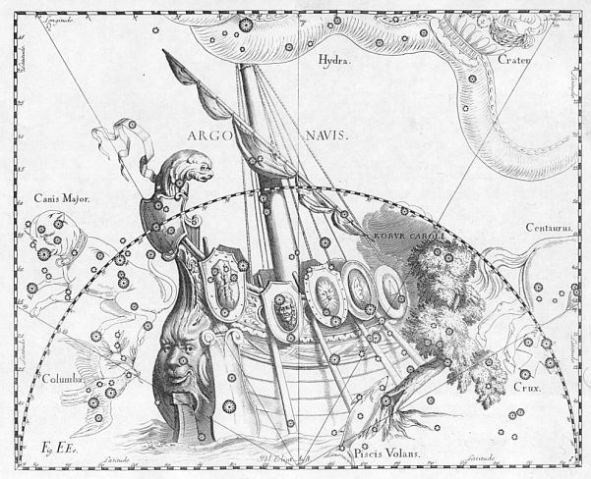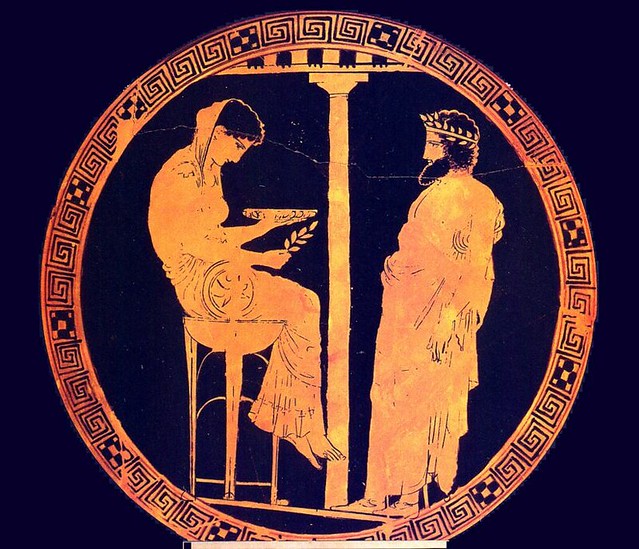Timanthes, “The Sacrifice of Iphigenia” (detail: Odysseus)
Homer’s Odyssey has always held an extreme fascination with me. All the characters and what happens to them have been coming back to me recently, perhaps in connection with Mercury retrograde with Neptune. The non-linear journey full of fantastical encounters seems to correlate well with these archetypes. There is such richness of themes in The Odyssey and so many layers; I am starting this series with little hope I will actually be able to exhaust this vast subject. But sing, o Muse, as Homer would put it. I will not be retelling the story in as much detail as I did in the series on Eros and Psyche, but I will be referring extensively to a book by Florence and Kenneth Wood Homer’s Secret Odyssey.
The blurb of the book says:
“Research now reveals that at a time when the Greeks did not have a written script, Homer concealed an astonishing range of learning about calendar making and cycles of the sun, moon and planet Venus in the Odyssey, his epic of the Fall of Troy and the adventures of the warrior-king Odysseus. With original research and content, this book is written to appeal to both popular and scholastic audiences, rolling back the history of Greek astronomy by three centuries.”
There is “a wealth of secret learning encrypted” in Homer’s epic, the authors claim:
“… the danger-filled adventures are played out not only on earth but also in parallel scenarios that conjure beautiful metaphorical images of stars, constellations and the Milky Way, set against the background of the wine-dark seas of the night skies.”
about the image: “Canopus is the second brightest star in the sky (only Sirius is of greater magnitude) and the second most important navigational star (after Polaris, the “north star”). Canopus was also the name of a town in the Nile delta in ancient Egypt and said to be the name of Odysseus’ (Ulysses) navigator (‘kybernos’ in Greek, the word from which ‘cybernetics’ and many other modern words related to information technology are derived) on the Argo.” (via: http://canopusresearch.com/about-canopus-research/)
Apart from its extraordinary literary value, the story of Odysseus was conceived to preserve the important ancient knowledge of the society that was pre-literate. Scholars believe that it was originally composed in oral tradition and written down much, much later. The truth is that it does sound beautiful when read aloud. Odysseus was renowned for his brilliant intelligence and cunning nature. Homer called him “ingenious” right in the first line of The Odyssey. The Trojan Horse ploy was after all his idea. Choosing a man with a brilliant mind as a hero is ideal for the task of preserving the wealth of ancient knowledge:
“To achieve his aims Homer created for Odysseus an alter ego as a personification of the moon. So closely is Odysseus’ iconic role linked to the calendar that the tempo of his adventures is governed by the rhythm of the monthly lunar cycle, from one new crescent moon to the next. … A range of literary devices are employed to conceal knowledge: Odysseus’ adventures contain the main body of learning but prominent characters, such as his wife Penelope, son Telemachus, the beautiful Helen of Troy, the pig-keeper Eumaeus and even his faithful hound Argus, are linked to the calculation of time.”
Odyssey (Bibliotheque Nationale de France)
Do you see the emerging pattern? Odysseus, the master of trickery and disguise, is himself used to smuggle in important knowledge. How ingenious on the part of Homer:
“Homer records such precise information about the lunar year, the solar year, luni-solar cycles and other calendrical matters that the astronomers of the eighth century BC have to be acknowledged as being far more advanced than has previously been recognized.”
I am reminded of Thoth, the ancient Egyptian god of the Moon presiding over knowledge and wisdom, who was also “scribe, doctor, scientist, magician, mathematician, astronomer, archivist, maker of calendars, inventor of wind and stringed musical instruments, patron of literature, grand vizier of Osiris,” as Raven Kaldera wittily puts it in his book Myth Astrology.
Thoth
The Odyssey with its protagonist is linked to Thoth in the sense that it combines the symbolism of the Moon and Mercury in order to impart knowledge and wisdom through metaphor, poetry, myth and stories. This has always been the most effective way of learning for me.
Related posts:
The Secrets of the Odyssey (2): Elements of Time (the Muse and the Moon)
The Secrets of the Odyssey (5): Lotus-Eaters, Auriga and Polyphemus
The Secrets of the Odyssey (8): the Sirens, Scylla & Charybdis, and Thrinacia
The Secrets of the Odyssey (9): Leucothea in the Sea of Space and Time
The Secrets of the Odyssey (11): Death of Odysseus, Master of Land Ways and Sea Ways


















Useful information as usual, and inspirational. Thank you. Been working on a piece of writing inspired by “The Odyssey” and by Constantine Cavafy’s poem “Ithaca”. Translation of “Ithaca” used: Stratis Haviaras http://www.cavafy.com/poems/content.asp?id=286&cat=1
Fascinated by secret meanings in writing, art etc.
LikeLike
Thank you for the link. The Odyssey is so incredibly seminal. A great novel I have read by Sandor Marai was “Peace on Ithaka,” which focused on Penelope instead of Odysseus. I hope my Odyssey series will not be as long and convoluted as Odysseus journey.
LikeLike
Look forward to your journey in words & symbols.
LikeLike
Look forward to the series Monica.
LikeLike
I will have to make a detour to write about Johfra’s Aquarius first…
LikeLike
Seems like one for the “must read” list. Thank you and I look forward to the series. I’m not sure about the veracity of this claim, but supposedly in Newton’s later years he became convinced that there were alchemical secrets encoded in Homers’ writings. Needless to say, the intelligentsia of the day thought that he was descending into madness. .
LikeLike
That is so interesting about Newton. He was also a passionate astrologer, so there might be a grain of truth in it.
LikeLike
Wow, that is all so interesting. Recently I’ve been following the teachings of a Mexican guy, Sergio Magaña, who is kind of working to restore the knowledge of ancient Mexico. They had done so much study of the skies, of the movements of the planets, etc – amazing the amount of knowledge that has been tossed aside along the way to the present day.
LikeLike
Yes, I agree. We do not give the ancients enough credit for their amazing and extensive knowledge.
LikeLike
“in order to impart knowledge and wisdom through metaphor, poetry, myth and stories. This has always been the most effective way of learning for me.”
You are not alone in that…
LikeLike
It is heartwarming to know there are more of us.
LikeLike
Looove the Egyptian image … bought very special a good luck charm in Egypt once … gave it to friend … sadly he didn’t honour it as much as I did … in fact he never mentions it ever … suspect he threw it away long time ago … but, no matter, cuz I keep the most precious things in my heart anyway …
LikeLike
Egyptian reliefs can be mesmerizing. Sorry about your friend’s attitude.
2014-02-08 20:31 GMT+01:00 symbolreader :
>
LikeLike
Great post. Greetings from Warsaw
LikeLike
Wow! I’m really looking forward to this series. I reckon I will be rereading The Odyssey soon 😉
LikeLike
I feel it is worth it, too.
LikeLike
I am excited about your series here as I have always thought this about this story but have never read anything analyzing it in this manner. Of course, James Joyce made a substantial Mercury retrograde sort of update and re-generation of this story into the 20th Century. Not sure if you remember, but my first real post ever on my blog was about this same idea, in connection to the appearance of Mercury in The Odyssey. It is interesting looking back at this now (August 2012) because I wrote this when Mercury was leaving a retrograde shadow zone and was opposite Neptune in Pisces instead of conjunct it now- I think included are also maybe some of your first ever comments to me:
http://esotericembers.wordpress.com/2012/08/28/mercurys-odyssey-through-leo-hermes-as-hero/
LikeLike
Now I have reread your post and I think it is an amazing working of Mercury retrograde me bringing this up again. Reading Ulysses will probably come next, who knows.
LikeLike
I look forward to this – I’ve always loved the Odyssey.
LikeLike
So have I, so much food for imagination there.
LikeLike
According to some researchers lots of Odyssey (ode to the Sea…?) actually went on historically in the adriatic sea. Some of croatian historians say that the land of Calypso could actually be an island of Mljet. In 2011 there was a finding of astrological map from those times in Croatia near sea, in some cave…
LikeLike
That is fascinating. Thank you for letting me know.
LikeLike
no problemo, my friend. I like your writing. I am completely on the side that myths like Odyssey were actually mytho narrations to keep up, hold on their knowledge about stars, time and so on. It’s like those stories from native american lore, they don’t really make sense, unless you know what the code words mean and what symbolism they carry. For instance flowering tree – an energetic body etc. This book you’ve read seems really interesting. About egyptian word for Seth. I have been of a view that these were actually classes of occult specialists within Egypt. That also goes for Thoth. The world Seth itself is so close to Siddh – the astronomer. And the count of 72 helpers to the sideral tropical movement within the ecliptic…
Best to you.
LikeLike
Dear Sebastian, thank you!!! My best to you too, Monika
LikeLike
How do you know so much fascinating stuff? Kudos to you.
LikeLike
Pingback: Odysseus’ Return from the Dead in the Vision of Tadeusz Kantor | symbolreader